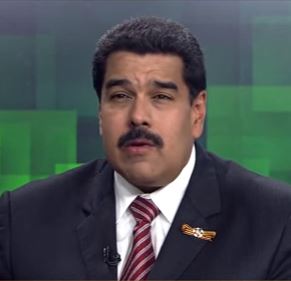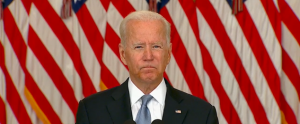
6 March 2022. National Review: ‘Deal With A Different Devil? Oil Markets Are Sending U.S. Leaders To Maduro’ By Carine Hajjar.
On Saturday, the New York Times reported that senior White House and State Department officials were in Caracas engaging in conversations with the Maduro regime. The U.S. has not recognized the regime since dissolving diplomatic relations with Venezuela in 2019 under Donald Trump. The Biden administration, meanwhile, has been distant with the U.S.-recognized Venezuelan opposition and hands-off when it comes to Nicolás Maduro.
But with oil at over $115 a barrel and the Biden administration considering sanctions on Russian oil imports, the White House is scrambling to find alternative oil sources. The Times also wrote that in the wake of escalatory rhetoric coming from Vladimir Putin, the Biden administration is trying to draw Maduro away from Putin:
Russia’s invasion of Ukraine has prompted the United States to pay closer attention to President Vladimir V. Putin’s allies in Latin America, which Washington believes could become security threats if the standoff with Russia deepens, according to current and former U.S. officials who spoke on the condition of anonymity to discuss sensitive policy matters.
The Maduro-Putin relationship is likely too strong to dislodge in the near future; on Tuesday, Maduro and Putin continued conversations about deepening their strategic relationship. For over two decades, Russia has built up Venezuela’s military capabilities and is its largest source of foreign currency. The Maduro regime has voiced its support for Putin and blamed the crisis in Ukraine on the U.S. and NATO.
Though the Biden administration is seemingly (and finally) waking up to the threat of Russian presence in Venezuela, the meeting is more likely a desperate bid to tamp down oil prices. The Wall Street Journal indeed reports that Biden officials are “seeking to ease oil sanctions on Venezuela as part of a broader U.S. strategy to temper oil prices,” with the meeting aimed at “allowing Venezuelan crude oil back on to the open international market.”
Some have come out in favor of establishing relations with Venezuela despite their dictatorial socialist regime. Trish Regan, for instance, thinks the U.S. can find a way to “align” with Venezuela and block Russia and China from profiting off of the country’s vast oil reserves:
Time to:
1. BAN ALL RUSSIAN ENERGY
2. Allow KeyStone Pipeline XL
3. Find a path to align with #Venezuela.Venezuela has THE largest source of oil reserves yet, we’re handing that to the Chinese and Russians?!!
Join me to discuss at 1pm exclusively 👇: https://t.co/20KkVxAaRY
— Trish Regan (@trish_regan) March 4, 2022
Others believe the Biden administration is using the Ukraine crisis as an excuse to make an oil deal with Maduro instead of investing in domestic-energy production. Senator Marco Rubio (R., Fla.) has been especially vocal on this position:
Biden esta usando a #Rusia como una excusa para hacer el acuerdo q siempre quiso hacer de todos modos con el régimen d #Maduro. En vez d producir más petróleo estadounidense, quiere reemplazar el petróleo q le compramos a un dictador asesino con petróleo de otro dictador asesino. pic.twitter.com/CIFsVIOFYf
— Marco Rubio (@marcorubio) March 6, 2022
Joe Biden using #Russia as an excuse to do the deal they always wanted to do anyway with the #MaduroRegime
Rather than produce more American oil he wants to replace the oil we buy from one murderous dictator with oil from another murderous dictatorhttps://t.co/HA7X71r2Mn
— Marco Rubio (@marcorubio) March 6, 2022
Venezuela isn’t the only murderous state the White House apparently is willing to bring back to the oil market. Iran is also being eyed as another source of oil amid shortages. As negotiations in Vienna come to a close, Robert Malley’s flimsy rendition of the JCPOA would give Iran access to an oil market with spiking prices, flooding the Islamic Republic with cash. With the Biden administration poised to lift terrorism sanctions on Tehran, this means that oil profits would go straight to Iranian proxies, like Hezbollah, while financing the IRGC’s destabilizing behavior across the Middle East.
Russia’s brutal invasion merits harsh sanctions, especially on its vital oil sector. But with diminished U.S. oil production, the Biden administration is faced with punishing one thuggish regime by rewarding another.




